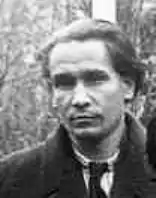Béla Uitz
Béla Uitz (8 March 1887, Mehála, Kingdom of Hungary (today part of Timișoara, Romania) – 26 January 1972, Budapest, Hungary) was a Hungarian painter and communist activist.

In 1907 he studied at the Hungarian National School of Applied Arts before moving on to the Hungarian Academy of Fine Arts in 1908.[1] In 1917 he joined the editorial team of MA.[2]
He attended the "Russian Evening" organised by MA (20 November 1920) which led him to rethink his political-artistic stance. In "Jegyzetek a 'Ma' orosz estélyéhez" (Notes on MAs Russian evening) an article published in MA he was very critical of the Russian Proletkult movement which he viewed as an obstacle to the parallel progress of the material and spiritual revolution he envisaged. Nevertheless he later developed a more sympathetic view of Proletkult, He then joined the Communist Party of Hungary who sent him with Alfréd Kemény to attend the 3rd Congress of the Communist International.[3] Whilst in Moscow he met Jolán Szilágyi, a Hungarian studying at VKhUTEMAS.[4]
He was the editor of Egység, a radical art journal published in Vienna and Berlin, 1922-1924. Aladár Komját was his co-editor.[4]
References
- "Uitz, Béla (1887 - 1972) - famous hungarian painter, graphic". kieselbach. Retrieved 26 June 2018.
- "Kassák Múzeum | Lajos Kassák (1887-1967)". Kassak Museum (in Hungarian). Retrieved 27 November 2018.
- Weibel, Peter (2005). Beyond Art: A Third Culture: A Comparative Study in Cultures, Art and Science in 20th Century Austria and Hungary. Springer Science & Business Media. ISBN 978-3-211-24562-0.
- Botar, Oliver A. I. (1993). "From the Avant-Garde to "Proletarian Art" The Emigre Hungarian Journals Egyseg and Akasztott Ember, 1922-23" (PDF). 52. Retrieved 26 June 2018. Cite journal requires
|journal=(help)